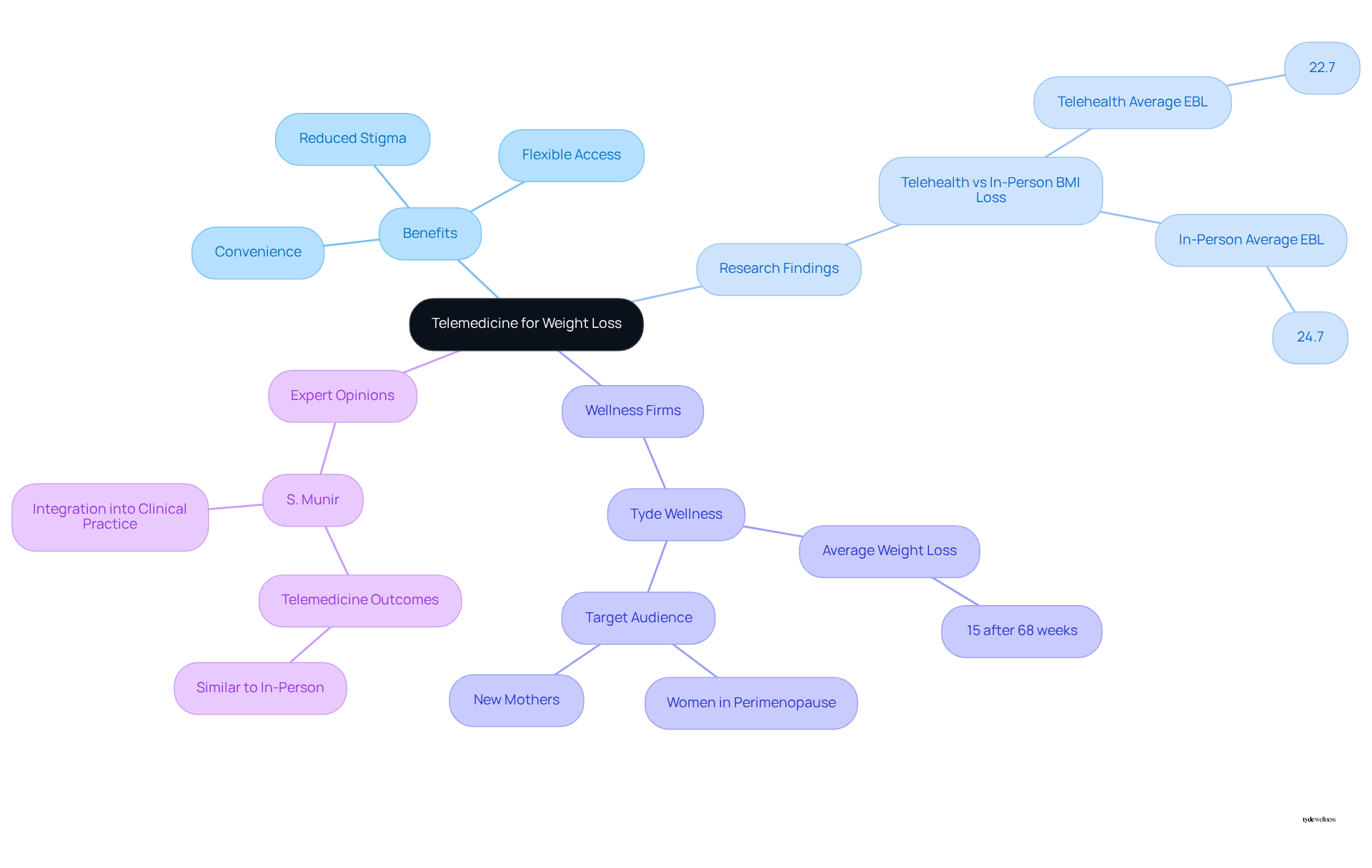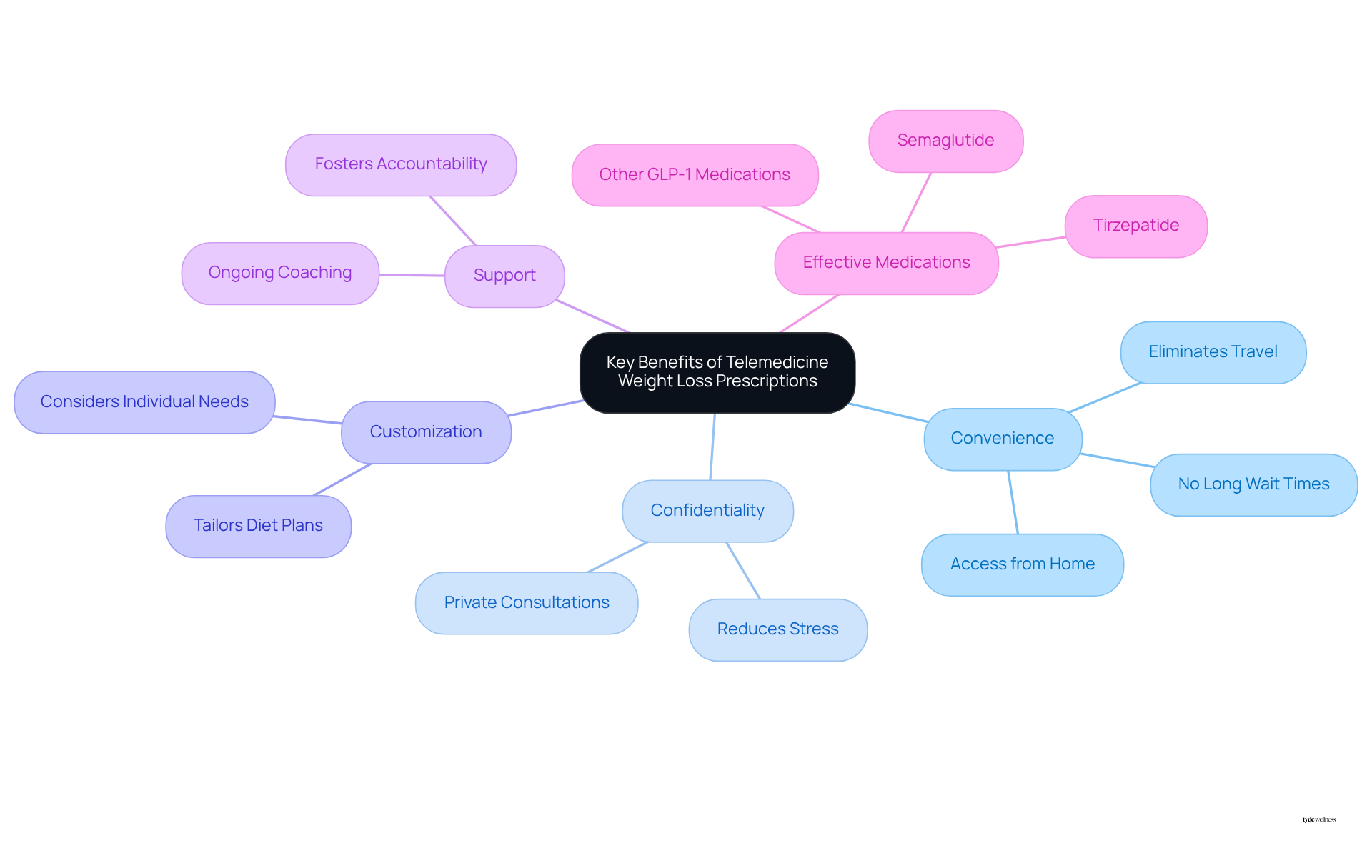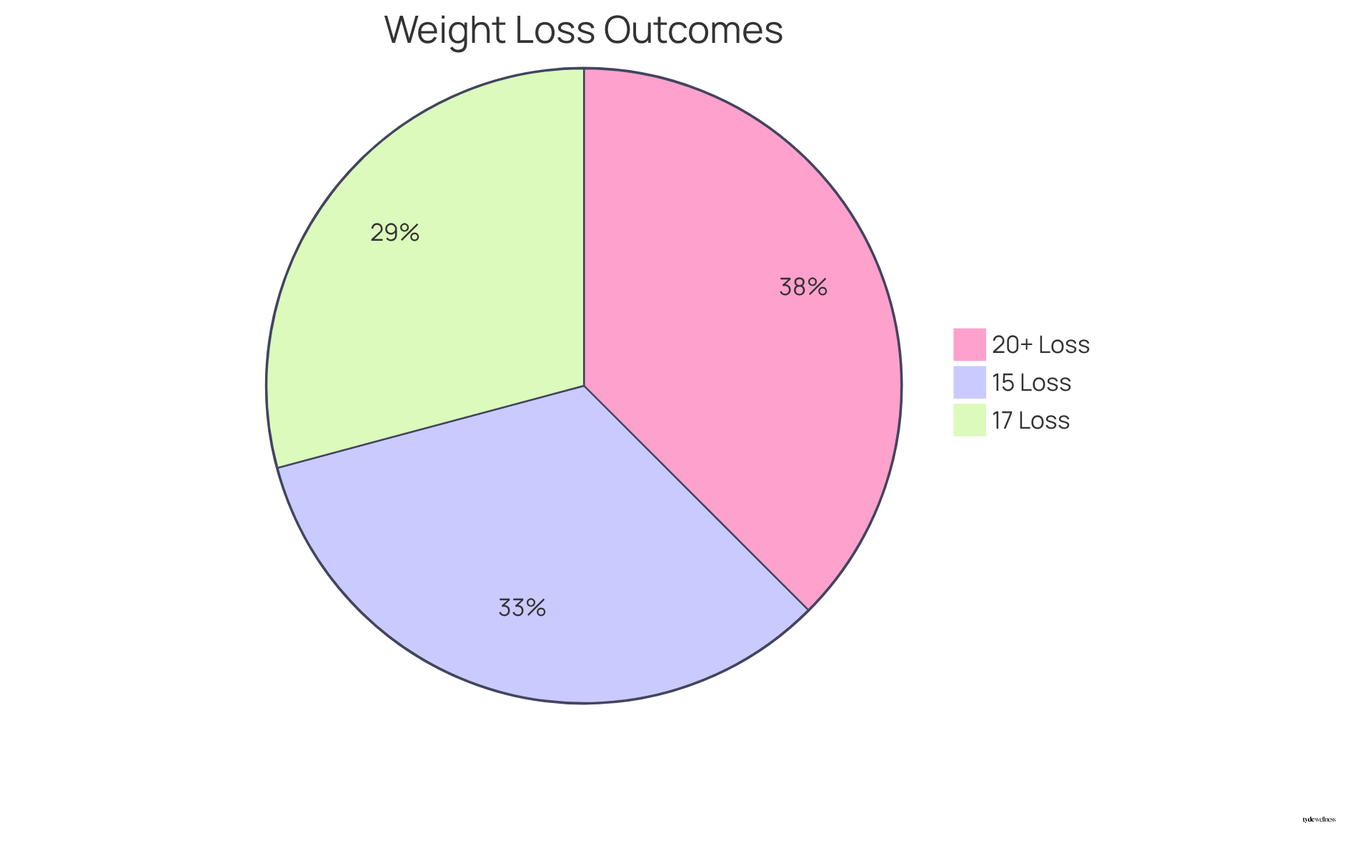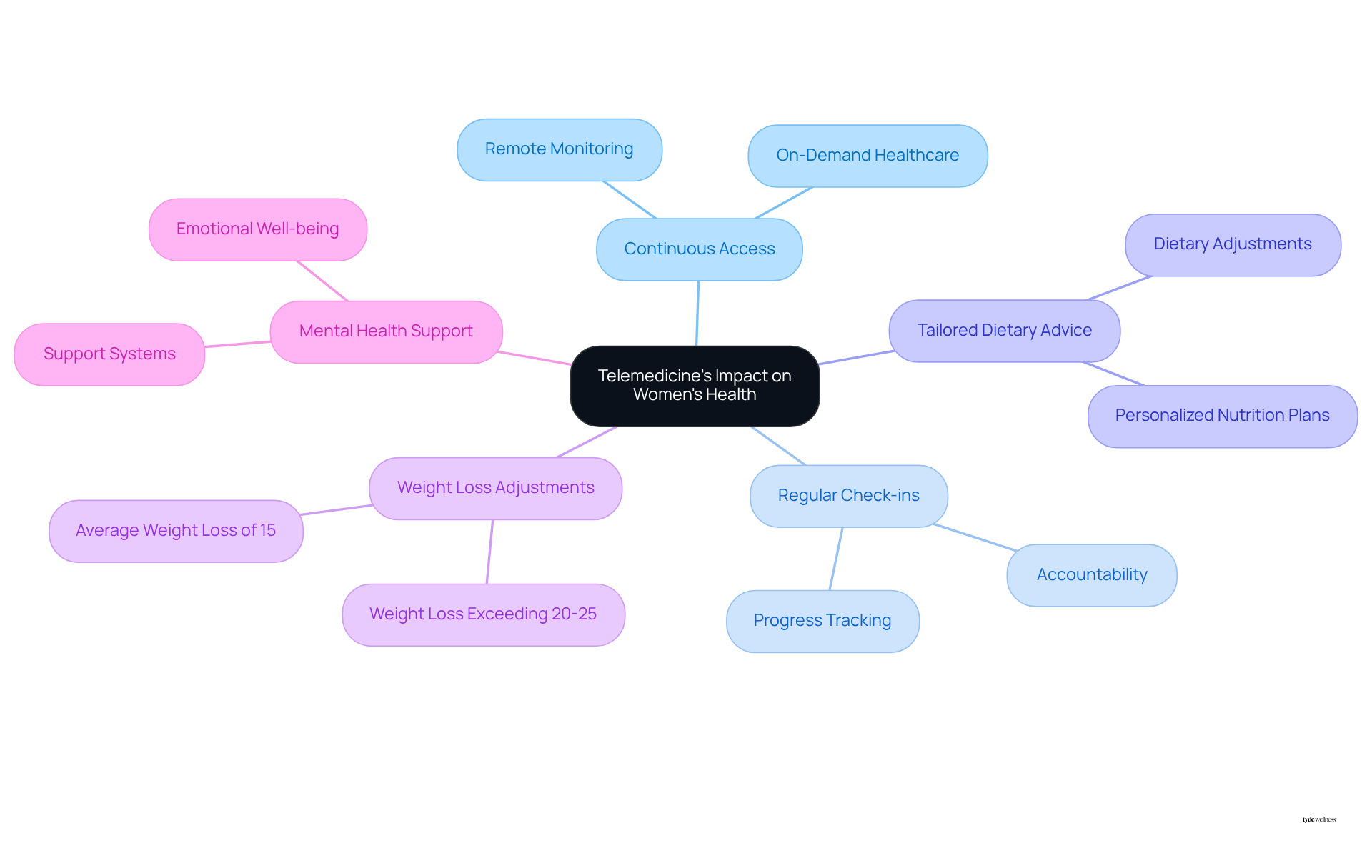Overview
Telemedicine weight loss prescriptions offer a convenient and personalized healthcare solution specifically designed for perimenopausal women, addressing their unique weight management challenges. These programs feature tailored weight loss strategies, including GLP-1 therapies, which have demonstrated significant efficacy.
By facilitating access to such programs, telemedicine empowers women to navigate hormonal fluctuations effectively. As a result, they can achieve sustainable weight loss while receiving the support they need to manage their health.
Introduction
The healthcare landscape is experiencing a significant transformation, with telemedicine emerging as an essential resource for individuals seeking innovative solutions to weight management. This is especially relevant for perimenopausal women, who frequently encounter unique challenges associated with hormonal changes. The introduction of telemedicine weight loss prescriptions presents a promising opportunity for empowerment and support.
As women navigate this intricate life stage, it is crucial to consider how telemedicine can not only facilitate weight loss but also enhance overall well-being in ways that traditional methods have often struggled to achieve.
Transforming Healthcare: The Rise of Telemedicine for Weight Loss
Telemedicine has emerged as a transformative force in healthcare, especially with the introduction of the telemedicine weight loss prescription. The COVID-19 pandemic significantly accelerated its adoption, as healthcare providers sought to maintain patient care while minimizing in-person visits. This shift has proven especially advantageous for individuals navigating complex health transitions, such as perimenopause and menopause, where traditional healthcare access can be limited. Telemedicine offers a convenient and flexible solution, allowing women to engage with healthcare professionals from the comfort of their homes. This method successfully dismantles obstacles connected to time, travel, and the stigma frequently linked with managing body mass by utilizing a telemedicine weight loss prescription.
Research shows that telehealth models can attain weight reduction results similar to in-person visits. For example, a study comparing remote medical consultations and in-person intensive behavioral therapy (IBT) found similar outcomes in excess body mass index reduction, with remote participants achieving an average excess BMI loss of 22.7% compared to 24.7% for in-person visits. This demonstrates that telehealth can provide effective support for individuals during pivotal life stages.
Furthermore, the growth of remote healthcare has been paired with a rise in wellness firms providing customized solutions for females, especially those undergoing hormonal fluctuations. These services frequently feature customized programs for reducing body mass that incorporate a telemedicine weight loss prescription with GLP-1 medications, tailored specifically for busy individuals, including new mothers and those going through perimenopause. The comprehensive approach of telehealth, which includes virtual consultations and ongoing coaching, has established it as a trusted partner for individuals seeking a telemedicine weight loss prescription and lasting health transformations.
Healthcare specialists acknowledge the advantages of remote medical services for females. As one expert noted, “the integration of telecare into clinical practice can enhance patient follow-up and provide unanticipated benefits for both patients and healthcare providers.” This comprehensive method not only tackles body management but also enhances overall wellness, making remote healthcare an essential resource in fostering sustainable reduction strategies tailored to females’ distinct health requirements. Additionally, the increased patient acceptance, regulatory changes, and cost reductions have facilitated the rapid adoption of telemedicine, further solidifying its role in modern healthcare.

Empowering Women: Key Benefits of Telemedicine Weight Loss Prescriptions
The advantages of telemedicine weight loss prescriptions empower individuals to take charge of their health and lose excess pounds. Firstly, the convenience of virtual consultations eliminates the need for time-consuming travel, making it easier for busy individuals, particularly those with family responsibilities, to access care. Secondly, remote healthcare provides a level of confidentiality and ease that can alleviate stress associated with discussing body concerns in person.
Furthermore, the customized nature of telemedicine allows healthcare professionals to tailor diet plans to individual needs, taking into account hormonal variations and lifestyle factors unique to women, such as cravings and energy fluctuations. This approach fosters a sense of accountability and support, which is crucial for long-term success in weight management. Participants in Tyde Wellness programs often achieve a reduction in body mass exceeding 20-25% within a year, underscoring the effectiveness of this innovative strategy.
Additionally, commonly prescribed medications like Semaglutide and Tirzepatide enhance the personalized treatment options available through a telemedicine weight loss prescription, further supporting individuals on their weight loss journey.

Harnessing GLP-1 Therapy: A Scientific Approach to Weight Loss in Perimenopause
GLP-1 (glucagon-like peptide-1) therapy has emerged as a transformative solution for reducing body mass, particularly for individuals navigating the challenges of perimenopause. This therapy mimics the effects of the GLP-1 hormone, which plays a crucial role in regulating appetite and insulin secretion. During perimenopause, hormonal changes frequently result in heightened cravings and challenges in managing body mass, with individuals generally gaining approximately three pounds annually during this transition.
GLP-1 therapy effectively addresses these issues by promoting satiety, curbing appetite, and enhancing metabolic function. Clinical studies suggest that females using GLP-1 medications can attain significant reductions in body mass, often surpassing 15% of their total mass. Notably, studies indicate that females on tirzepatide (Zepbound) along with hormone therapy shed an average of 17% of their body mass, in contrast to 14% for those not receiving hormone therapy.
Moreover, 45% of females on Zepbound and hormone therapy attained at least 20% total body mass reduction, highlighting the efficacy of this combined treatment method. This scientific approach not only aids in weight management but also enhances overall health outcomes, making GLP-1 therapy an invaluable resource during this pivotal life stage.
In addition, incorporating resistance training is essential for menopausal individuals on GLP-1 therapy to preserve lean body mass and overall health. However, it is crucial to consider potential risks associated with combining GLP-1 therapy and hormone therapy, especially for individuals with significant cardiovascular risk factors. As observed by specialists in the area, a tailored approach is essential to guarantee the optimal results for individuals undergoing these treatments.

Sustainable Change: The Long-Term Impact of Telemedicine on Women’s Health
The lasting impact of remote healthcare on women’s well-being extends beyond immediate results. By providing continuous access to healthcare professionals, virtual care creates an environment of ongoing support and accountability—key elements of Tyde Wellness’s comprehensive, personalized care approach, which may involve a telemedicine weight loss prescription. Women benefit from:
- Regular check-ins
- Tailored dietary advice
- Necessary adjustments to their weight loss plans
These elements are essential for maintaining progress toward their goals with a telemedicine weight loss prescription. This sustained engagement is crucial for cultivating healthy habits that persist over time.
Moreover, remote healthcare facilitates the integration of mental health support, addressing the emotional dimensions of managing body weight that are frequently neglected. As women navigate the complexities of hormonal changes, a robust support system that includes a telemedicine weight loss prescription can significantly improve mental well-being and overall quality of life. Participants in Tyde Wellness programs report an average body weight loss of 15% after 68 weeks, with many achieving weight loss exceeding 20-25% within a year. This data underscores the effectiveness of this approach and its potential for lasting health transformations.

Conclusion
Telemedicine has transformed the approach to weight management, especially for perimenopausal women. This innovative method enhances accessibility to healthcare and creates a supportive, personalized environment that empowers women to take control of their health. By utilizing telemedicine weight loss prescriptions, individuals can more effectively navigate the complexities of hormonal changes and lifestyle challenges.
The article emphasizes several key benefits of telemedicine, such as:
- The convenience of virtual consultations
- The customized nature of dietary plans
- The integration of GLP-1 therapy
Together, these elements contribute to significant weight loss outcomes. Research shows that women engaged in telehealth programs often experience substantial reductions in body mass, highlighting the effectiveness of this method. Additionally, the ongoing support and accountability offered through remote healthcare encourage sustainable lifestyle changes that extend beyond immediate results.
In a broader context, the emergence of telemedicine represents a shift towards more inclusive and adaptable healthcare solutions for women. As telehealth continues to progress, it is essential for individuals to embrace these innovations and explore the resources available to them. Empowering women through telemedicine not only facilitates weight loss but also enhances overall health and well-being, paving the way for a healthier future.
Frequently Asked Questions
What is telemedicine and how has it impacted weight loss prescriptions?
Telemedicine is a healthcare delivery method that allows patients to consult with healthcare professionals remotely, often through video calls or other digital platforms. It has significantly impacted weight loss prescriptions by providing a convenient and flexible way for individuals, particularly women, to access care without needing in-person visits.
Why did the adoption of telemedicine accelerate during the COVID-19 pandemic?
The COVID-19 pandemic accelerated the adoption of telemedicine as healthcare providers sought to maintain patient care while minimizing in-person visits to reduce the risk of virus transmission.
How does telemedicine benefit individuals navigating health transitions like perimenopause and menopause?
Telemedicine offers a convenient solution for women experiencing perimenopause and menopause, allowing them to engage with healthcare professionals from home. This method helps dismantle barriers related to time, travel, and stigma associated with managing body mass.
Are the outcomes of telehealth weight loss programs comparable to in-person visits?
Yes, research indicates that telehealth models can achieve weight reduction results similar to in-person visits. For instance, a study found that remote participants had an average excess body mass index (BMI) loss of 22.7%, compared to 24.7% for in-person visits.
What types of services do wellness firms offer through telemedicine for weight loss?
Wellness firms provide customized solutions for women, particularly those experiencing hormonal fluctuations. These services often include tailored weight loss programs that incorporate telemedicine weight loss prescriptions with GLP-1 medications, designed for busy individuals like new mothers and those going through perimenopause.
What advantages do healthcare specialists see in telemedicine for female patients?
Healthcare specialists recognize that telemedicine enhances patient follow-up and offers unexpected benefits for both patients and providers. It addresses body management while also improving overall wellness, making it a valuable resource for sustainable weight loss strategies tailored to women’s unique health needs.
What factors have contributed to the rapid adoption of telemedicine in healthcare?
Increased patient acceptance, regulatory changes, and cost reductions have facilitated the rapid adoption of telemedicine, further solidifying its role in modern healthcare.
List of Sources
- Transforming Healthcare: The Rise of Telemedicine for Weight Loss
- FTC Takes Action Against Telemedicine Firm NextMed Over Charges It Used Misleading Prices, Fake Reviews, and Deceptive Weight Loss Claims to Sell GLP-1 Weight-Loss Programs (https://ftc.gov/news-events/news/press-releases/2025/07/ftc-takes-action-against-telemedicine-firm-nextmed-over-charges-it-used-misleading-prices-fake)
- Adoption of telemedicine for obesity treatment during the COVID-19 pandemic achieved comparable outcomes to in-person visits – PMC (https://pmc.ncbi.nlm.nih.gov/articles/PMC11405989)
- Novo Nordisk expands patient access to authentic, FDA-approved Wegovy® via collaborations with multiple telehealth organizations (https://prnewswire.com/news-releases/novo-nordisk-expands-patient-access-to-authentic-fda-approved-wegovy-via-collaborations-with-multiple-telehealth-organizations-302441147.html)
- As GLP-1 compounding stares down a wall, telehealth companies pivot to hormones (https://statnews.com/2025/03/11/telehealth-firms-pivot-from-glp1-weight-loss-drugs-to-hormone-replacement-therapy)
- Empowering Women: Key Benefits of Telemedicine Weight Loss Prescriptions
- As GLP-1 compounding stares down a wall, telehealth companies pivot to hormones (https://statnews.com/2025/03/11/telehealth-firms-pivot-from-glp1-weight-loss-drugs-to-hormone-replacement-therapy)
- Telehealth for Weight Loss: Benefits and How It Works (https://forhers.com/blog/telehealth-for-weight-loss)
- How Weight Loss Telemedicine Creates Convenient Access (https://blissfulnm.com/how-telemedicine-for-weight-loss-can-conveniently-increase-access-to-care)
- The Rise of a Telemedicine Weight Loss Prescription – Ivím Health (https://ivimhealth.com/the-rise-of-a-telemedicine-weight-loss-prescription?srsltid=AfmBOor-n5lGPJm4w-Pok_y5AgXLf7hSDGeht2R9x7irDNvjD69Suifb)
- Are virtual consultations effective for weight loss? (https://pharmko.com/blog/are-virtual-consultations-effective-for-weight-loss)
- Harnessing GLP-1 Therapy: A Scientific Approach to Weight Loss in Perimenopause
- Women in Menopause Benefit From GLP-1 Weight-Loss Medications as Much as Younger Women | Research | Advances in Endocrinology, and Women’s Health | NewYork-Presbyterian (https://nyp.org/advances/article/women-in-menopause-benefit-from-glp-1-weight-loss-medications-as-much-as-younger-women)
- Menopause Hormone Therapy Boosts GLP-1 Drug Effectiveness, Researchers Say Piedmont Orthopedics | OrthoAtlanta (https://orthoatlanta.com/health-news/menopause-hormone-therapy-boosts-glp-1-drug-effectiveness-researchers-say)
- Can Combining GLP-1s and Hormone Therapy Boost Weight Loss? A New Study Shows Significant Results (https://oprahdaily.com/life/health/a65476576/hormone-therapy-glp-1-menopause-weight-loss-study)
- Menopausal hormone therapy may boost weight loss seen with Zepbound (https://healio.com/news/endocrinology/20250713/menopausal-hormone-therapy-may-boost-weight-loss-seen-with-zepbound)
- Are GLP-1s a Cure for Menopausal Weight Gain? (https://vogue.com/article/glp-1s-menopausal-weight-gain)
- Sustainable Change: The Long-Term Impact of Telemedicine on Women’s Health
- Telemedicine and low-carb diet slashes diabetes meds and drives lasting remission (https://news-medical.net/news/20241022/Telemedicine-and-low-carb-diet-slashes-diabetes-meds-and-drives-lasting-remission.aspx)
- Telemedicine and its impact on public health in the United States: a contemporary review – The Egyptian Journal of Internal Medicine (https://ejim.springeropen.com/articles/10.1186/s43162-025-00451-8)
- The Virtual Care Surge in Women’s Health: What’s Driving the Demand? (https://wheel.com/companies-blog/virtual-care-womens-health-telehealth-trends-market-growth)
- Are tele-health visits effective for weight care? (https://pharmko.com/blog/are-tele-health-visits-effective-for-weight-care)
- What Impact Will Telehealth Have on Women’s Health Beyond the Pandemic? (https://womentech.net/how-to/what-impact-will-telehealth-have-womens-health-beyond-pandemic)



